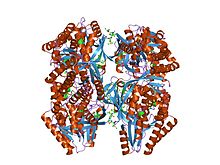GHMP kinase family
Appearance
| GHMP kinases N terminal domain | |||||||||
|---|---|---|---|---|---|---|---|---|---|
 crystal structure of the streptococcus pneumoniae phosphomevalonate kinase (pmk) | |||||||||
| Identifiers | |||||||||
| Symbol | GHMP_kinases_N | ||||||||
| Pfam | PF00288 | ||||||||
| Pfam clan | CL0329 | ||||||||
| InterPro | IPR006204 | ||||||||
| PROSITE | PDOC00545 | ||||||||
| SCOP2 | 1fwl / SCOPe / SUPFAM | ||||||||
| |||||||||
| GHMP kinases C terminal | |||||||||
|---|---|---|---|---|---|---|---|---|---|
 pyrococcus furiosus galactokinase in complex with galactose, adp and magnesium | |||||||||
| Identifiers | |||||||||
| Symbol | GHMP_kinases_C | ||||||||
| Pfam | PF08544 | ||||||||
| InterPro | IPR013750 | ||||||||
| PROSITE | PDOC00545 | ||||||||
| SCOP2 | 1fwl / SCOPe / SUPFAM | ||||||||
| |||||||||
In molecular biology, the GHMP kinase family is a family of kinase enzymes. Members of this family include homoserine kinases EC 2.7.1.39, galactokinases EC 2.7.1.6, and mevalonate kinasesEC 2.7.1.36. These kinases make up the GHMP kinase superfamily of ATP-dependent enzymes.[1] These enzymes are involved in the biosynthesis of isoprenes and amino acids as well as in carbohydrate metabolism. These enzymes contain, in their N-terminal section, a conserved Gly/Ser-rich region which is probably involved in the binding of ATP.[2][3] The C-terminal domain of homoserine kinase has a central alpha-beta plait fold and an insertion of four helices, which, together with the N-terminal fold, creates a novel nucleotide binding fold.[4]
References
- ^ Bork P, Sander C, Valencia A (January 1993). "Convergent evolution of similar enzymatic function on different protein folds: the hexokinase, ribokinase, and galactokinase families of sugar kinases". Protein Sci. 2 (1): 31–40. doi:10.1002/pro.5560020104. PMC 2142297. PMID 8382990.
- ^ Tsay YH, Robinson GW (February 1991). "Cloning and characterization of ERG8, an essential gene of Saccharomyces cerevisiae that encodes phosphomevalonate kinase". Mol. Cell. Biol. 11 (2): 620–31. PMC 359713. PMID 1846667.
- ^ Lee M, Leustek T (December 1999). "Identification of the gene encoding homoserine kinase from Arabidopsis thaliana and characterization of the recombinant enzyme derived from the gene". Arch. Biochem. Biophys. 372 (1): 135–42. doi:10.1006/abbi.1999.1481. PMID 10562426.
- ^ Zhou T, Daugherty M, Grishin NV, Osterman AL, Zhang H (December 2000). "Structure and mechanism of homoserine kinase: prototype for the GHMP kinase superfamily". Structure. 8 (12): 1247–57. doi:10.1016/s0969-2126(00)00533-5. PMID 11188689.
